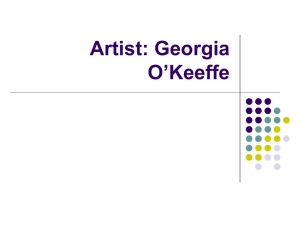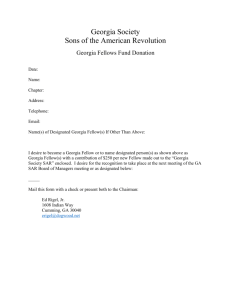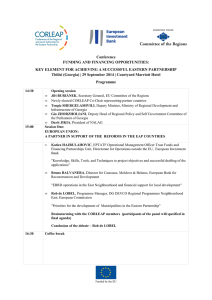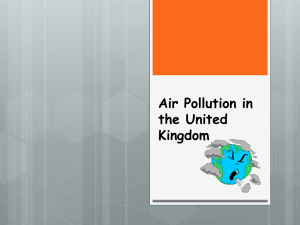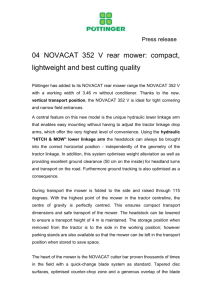Communication-Resources-May-2012
advertisement
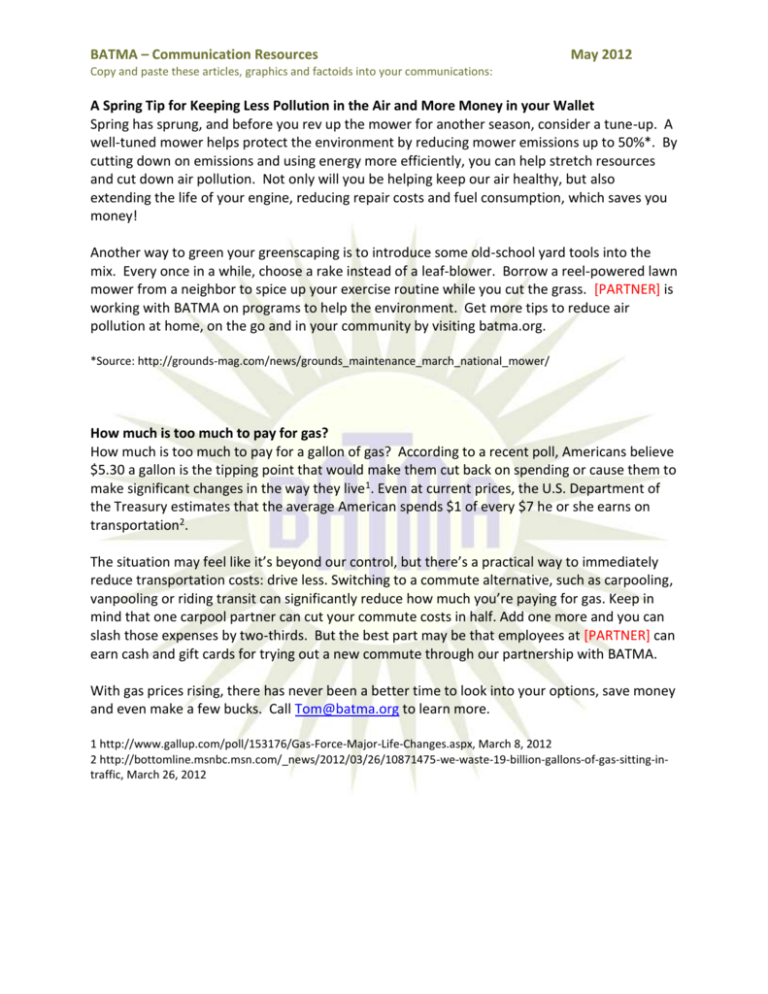
BATMA – Communication Resources May 2012 Copy and paste these articles, graphics and factoids into your communications: A Spring Tip for Keeping Less Pollution in the Air and More Money in your Wallet Spring has sprung, and before you rev up the mower for another season, consider a tune-up. A well-tuned mower helps protect the environment by reducing mower emissions up to 50%*. By cutting down on emissions and using energy more efficiently, you can help stretch resources and cut down air pollution. Not only will you be helping keep our air healthy, but also extending the life of your engine, reducing repair costs and fuel consumption, which saves you money! Another way to green your greenscaping is to introduce some old-school yard tools into the mix. Every once in a while, choose a rake instead of a leaf-blower. Borrow a reel-powered lawn mower from a neighbor to spice up your exercise routine while you cut the grass. [PARTNER] is working with BATMA on programs to help the environment. Get more tips to reduce air pollution at home, on the go and in your community by visiting batma.org. *Source: http://grounds-mag.com/news/grounds_maintenance_march_national_mower/ How much is too much to pay for gas? How much is too much to pay for a gallon of gas? According to a recent poll, Americans believe $5.30 a gallon is the tipping point that would make them cut back on spending or cause them to make significant changes in the way they live1. Even at current prices, the U.S. Department of the Treasury estimates that the average American spends $1 of every $7 he or she earns on transportation2. The situation may feel like it’s beyond our control, but there’s a practical way to immediately reduce transportation costs: drive less. Switching to a commute alternative, such as carpooling, vanpooling or riding transit can significantly reduce how much you’re paying for gas. Keep in mind that one carpool partner can cut your commute costs in half. Add one more and you can slash those expenses by two-thirds. But the best part may be that employees at [PARTNER] can earn cash and gift cards for trying out a new commute through our partnership with BATMA. With gas prices rising, there has never been a better time to look into your options, save money and even make a few bucks. Call Tom@batma.org to learn more. 1 http://www.gallup.com/poll/153176/Gas-Force-Major-Life-Changes.aspx, March 8, 2012 2 http://bottomline.msnbc.msn.com/_news/2012/03/26/10871475-we-waste-19-billion-gallons-of-gas-sitting-intraffic, March 26, 2012 BATMA – Communication Resources May 2012 Copy and paste these articles, graphics and factoids into your communications: Air Aware: When it comes to better breathing, every mile counts Many of us don’t have a reason to think about outdoor air quality unless we see a brown band of smog over the skyline. But it’s clear that air quality affects Georgia’s health, environment and economy. And a number of signs point to the air out there getting better. In recent years, a combination of advancements in technology, environmental protection policies and voluntary programs like commute options available at [PARTNER] workplaces have combined to help improve Georgia’s air quality. In fact, in two of the past three years, no regions in Georgia experienced any Code Red Smog Alerts, which are issued when air quality is deemed unhealthy for everyone. While the state is making progress, there’s more work to be done. Since half of all smogforming emissions in the region come from the tailpipes of cars and trucks, switching to a commute alternative like carpooling, bicycling or riding transit can make a big difference. [PARTNER] has established a partnership with BATMA to make it easier for you to start using the different options available. And during Air Quality Awareness Week in Georgia, which takes place from April 30 to May 4, you can learn more about other actions you can take, like signing up to receive Smog Alerts so you’ll know when there’s a forecast for unhealthy air quality. Contact Tom@batma.org to learn more. “Tired” of Rising Costs? Make a change where the rubber meets the road. We always seem to have an endless list of things to fix, replace and buy. One purchase that can make many of us groan, is tires. You might have noticed that over the past couple years, the cost of a new set of tires, like many other purchases, has risen. Doing the math, tire prices have actually increased 70% since 2009*. That’s like paying almost $3.25 for a loaf of bread when you had been only paying $1.90! The price increase is due to multiple factors – rising energy and transportation costs, as well as a global rubber shortage. However, [PARTNER], along BATMA has a solution that can save you some of your hard-earned dollars. Drive less to make your tires last longer. A great place to start is on your trips to and from work. Simple, right? There are so many alternatives to driving your car – walking, biking and riding transit. You can even carpool with a neighbor or a co-worker to alternate days when you use your car. When you choose any of these options, you are sure to add to the lifespan of your tires AND hold onto more cash. For more information on commute options programs available at [PARTNER], plus details on how you can earn up to $100, contact Tom@batma.org . *Source: http://www.dunntireblog.com/understanding-price-increases-tire-industry-part-1 BATMA – Communication Resources May 2012 Copy and paste these articles, graphics and factoids into your communications: Suggested caption: Rising energy and transportation costs, combined with a global shortage of rubber, have caused tire prices to increase dramatically since 2009. [PARTNER], together BATMA, offers programs to help you make your tires last longer by using them less. For more information on commute options programs available at [PARTNER], plus details on how you can earn up to $100, contact … Source: http://www.dunntireblog.com/understanding-price-increases-tire-industry-part-1 Suggested caption: Based on the latest available data, each workday in Metro Atlanta, the efforts of carpool, vanpool, transit, bicycle and walking commuters at [PARTNER] and thousands of other organizations across town help keep more than 700 tons of pollution out of the air we all breathe, a 118% improvement over 2003. Keep up the great work! Source: Center for Transportation and the Environment study conducted on behalf of the Georgia Department of Transportation. BATMA – Communication Resources May 2012 Copy and paste these articles, graphics and factoids into your communications: Factoids: Georgia has not experienced a Code Red day - indicating unhealthy air quality for all - since July 2010. Source: Georgia Environmental Protection Division Air Monitoring Branch historical data. The total number of gas stations operating in the U.S. declined from 200,000 in 1994 to 164,000 in 2007. Source: U.S. Department of Energy, December 2008 http://www1.eere.energy.gov/vehiclesandfuels/facts/2008_fotw548.html A recent medical study suggests air pollution may disrupt brain chemistry, causing us to overeat and sleep less. Fight back by incorporating walking or bicycling into your daily commute. Source: Discovery News, March 15, 2012 Rising demand for rubber in other parts of the world has caused tire prices to increase as much as 70% since 2009. Make your vehicle’s tires last longer by using them less. Try carpooling, vanpooling or using other alternatives with help from [PARTNER], and BATMA. Source: Christian Science Monitor, August 2011 London engineers have developed a prototype for a calcium-based adhesive glue that is sprayed on area roads to trap particle pollution and prevent it from going airborne. Source: The Atlantic Cities, November 22, 2011 More than 20,000 Metro Atlantans have signed up to receive Smog Alerts from The Clean Air Campaign. When the next day’s air quality is forecasted by the Georgia Environmental Protection Division to be unhealthy, these alerts offer ideas to help people limit their exposure to ground-level ozone and particle pollution. Sign up to get Smog Alerts e-mailed straight to your inbox at CleanAirCampaign.org.
